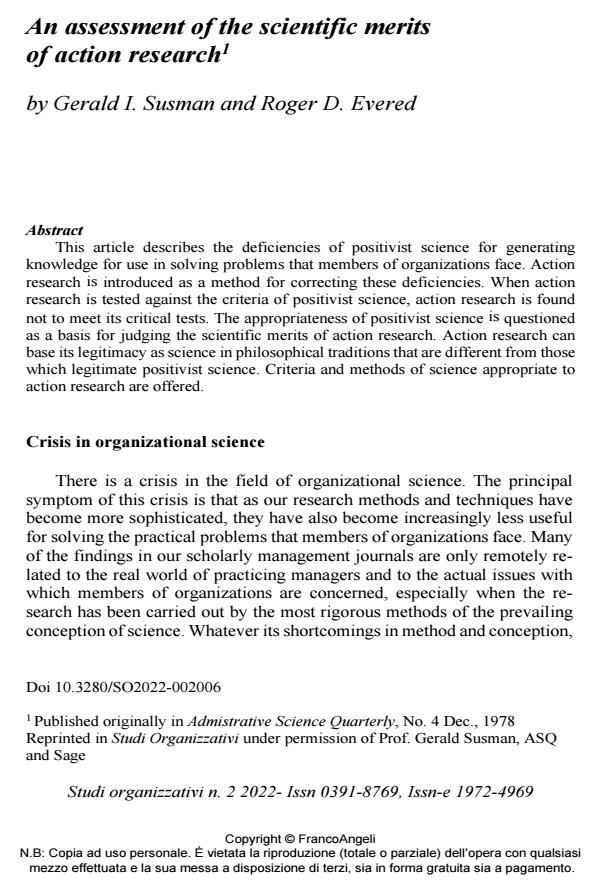An assessment of the scientific merits of action research
Titolo Rivista STUDI ORGANIZZATIVI
Autori/Curatori Gerald I. Susman, Roger D. Evered
Anno di pubblicazione 2023 Fascicolo 2022/2
Lingua Inglese Numero pagine 27 P. 135-161 Dimensione file 343 KB
DOI 10.3280/SO2022-002006
Il DOI è il codice a barre della proprietà intellettuale: per saperne di più
clicca qui
Qui sotto puoi vedere in anteprima la prima pagina di questo articolo.
Se questo articolo ti interessa, lo puoi acquistare (e scaricare in formato pdf) seguendo le facili indicazioni per acquistare il download credit. Acquista Download Credits per scaricare questo Articolo in formato PDF

FrancoAngeli è membro della Publishers International Linking Association, Inc (PILA)associazione indipendente e non profit per facilitare (attraverso i servizi tecnologici implementati da CrossRef.org) l’accesso degli studiosi ai contenuti digitali nelle pubblicazioni professionali e scientifiche
This article describes the deficiencies of positivist science for generating knowledge for use in solving problems that members of organizations face. Action research is introduced as a method for correcting these deficiencies. When action research is tested against the criteria of positivist science, action research is found not to meet its critical tests. The appropriateness of positivist science is questioned as a basis for judging the scientific merits of action research. Action research can base its legitimacy as science in philosophical traditions that are different from those which legitimate positivist science. Criteria and methods of science appropriate to action research are offered.
- AI-Enabled Predictive Analytics in Smart Grids: The Case of Sweden Theodore Kindong, Bjorn Johansson, Victoria Paulsson, in Complex Systems Informatics and Modeling Quarterly /2025 pp.43
DOI: 10.7250/csimq.2025-42.03 - Studying English Among Economics Students in the Context of Global Cross-Cultural Communication ZuoYuan Liu, Ainash Alzhanova, Aizhan Smailova, Olga Pavlovskaya, Olga Sakhno, in Journal of Intercultural Communication 1141/2025 pp.250
DOI: 10.36923/jicc.vi.1141 - Digiphysical Approach in Post-COVID Rehabilitation: Process-Oriented Tool Support and Solution Patterns Martin Henkel, Erik Perjons, Kristian Borg, Uno Fors, Jan Johansson, Marika C. Möller, Christer Wåhlander, in Complex Systems Informatics and Modeling Quarterly /2025 pp.1
DOI: 10.7250/csimq.2025-42.01 - Collaborative Research Design Anders Haug, Ewout Reitsma, Kristian Bloch Haug, pp.277 (ISBN:978-3-031-70148-1)
- Advancing AECO Education: A project-Based Lean IPD Design Process and Design Management Course Ergo Pikas, Müge Tetik, Olli Seppänen, Kädi-Riin Vendel, in International Journal of Construction Education and Research /2025 pp.1
DOI: 10.1080/15578771.2025.2534334 - 2025 ASEE Annual Conference & Exposition Proceedings Daniel Adeniranye, Bruk Berhane, Jingjing Liu, Julian Sosa-Molano, Gabriel Najera, (DOI:10.18260/1-2--57050)
Gerald I. Susman, Roger D. Evered, An assessment of the scientific merits of action research in "STUDI ORGANIZZATIVI " 2/2022, pp 135-161, DOI: 10.3280/SO2022-002006